|
|
|
And You Call Yourself A Scientist!
|
|
|
Jabootu
|
|
|
Opposable Thumb Films
|
|
|
Stomp Tokyo
|
|
|
Teleport City
|
|
|
The Unknown Movies
|
|
Once there was a thing called the 80s. I hated
the 80s. Not for the usual reasons that seem to accompany statements
like that – you know, critiquing the clothes, the music,
things like that. Things that inevitably lead to discussions like,
"Oh yeah? Oh, YEAH? Well, I hate the 70s!" "You
don't get to hate the 70s. You weren't even alive during the 70s."
"Oh, yeah??!! Well, you suck!" And so
on. God, I love the Internet. My reasons for hating the 80s are
intensely personal, and mostly have to do with long periods of
struggle and setbacks. People who say things like "We were
poor, but happy" need to be put in a time machine and given
a refresher course in the grind of day-to-day existence.
My opening bitterness aside, I find people tend
to recall decades of their lives in terms of two major shaping
influences, politics and pop culture, rather than
personal experience. When we bombed the hell out of Syria, say,
instead of "that semester I lived on Ramen noodles and love".
Remembering when you were especially poor is a drag. Remembering
how much you hated Michael Jackson's appropriation of Sgt. Pepper's
fashion sense is much more satisfying.
As we move forward through this modern age, politics
and pop culture have become inextricably intermingled, one affecting
the other, as competing entertainment outlets vie to give us stories "torn out of today's headlines!" (although the current trend seems
to be towards fearful jerking of possibly "traumatizing" images out of entertainment - witness the exclusion of Twin Towers
or space shuttle imagery in recent months) The intersection of
politics and entertainment is particularly germane to today's
subject. And realize, it's dang near impossible to talk about
what made up the 80s without at least mentioning Cannon
Films, and its guiding lights during that period: two successful
Israeli producers named Menahem Golan and Yoram Globus.
Moving to America in 1979, these two cousins bought
controlling interest in then less-than-successful Cannon Films
and proceeded to pull the studio out of the red by producing well-marketed
populist movies that latched onto the zeitgeist of the
times. In a very real way, Cannon was the American International
of the 80s, and Golan-Globus were the James Nicholson and Samuel
Arkoff of their time.
The most pertinent intersection of politics and
entertainment here appears in the person of the 1985 action flick,
Rambo: First Blood, Part II. A sequel to the 1982 First
Blood (which is itself a pretty good little movie). Rambo
put aside the suspense aspect of its predecessor to provide an
adrenaline-drenched tale of a one-man army returning to Vietnam
to kick ass and chew bubble gum, and he somehow forgot to pack
the bubble gum. Actually pretty much a re-hashing of World War
II movie tropes - the North Vietnamese behave like brutish propaganda
Japs and the Soviets are undeniably Nazis - Rambo hit a
resonant national chord. America had never really gotten over
the fact that we wound up running away from that conflict. A certain
president avowed that this was a favorite movie, and new numbers
had to be invented to total up the box office take. Not being
fools (at least at this point in their career), Golan and Globus
took note of this.
Vietnam movies had been something of a going concern
for years – The Boys in Company C, Go Tell the Spartans – but they were largely, shall we say, darker movies,
indicative of America's smarting recollection of that war. Cannon
had it's own, more action-oriented version, the Braddock Missing
In Action series. Deciding it was time for their own one-man
army to take on the Forces of Communist Evil, they called upon
resident action hero Chuck Norris and out came Invasion USA.
The movie opens with a boatload of Cuban refugees
stuck in a craft with a broken motor. Everyone is jubilant as
a Coast Guard cruiser pulls alongside and the captain says in
Spanish, "Welcome to the United States!" Alas, if only these people
had better access to American movies! They would have realized
the captain is Richard Lynch, and that's never a good sign. Sure enough, everybody on board is soon
dancing the machine gun ballet, as Lynch (playing a terrorist
mastermind named Rostov) and his crew kill everyone for the other
thing the boat is smuggling into America: a hold full of cocaine.
Next up, Rostov trades the cocaine to a sleazoid
(Billy Drago!) for a buttload of weapons. Lynch then seals the
deal by shooting everyone in the office and tossing Drago's knife-weilding
ho out a window. (As anyone who has played the game Hitman
can tell you, shooting people in a building is no problem, but
toss one ho out a window, and sirens start blaring).
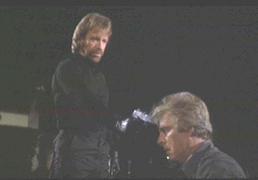 Uh,
wait a minute… didn't I say this was a Chuck Norris movie?
Sure enough, it is, but he barely registers in this first part
of the flick. He's too busy driving an airboat all over the swamp,
wrestling alligators with his Injun pal and turning down offers
to come back to work for "The Agency" (probably because he refuses
to work with Steven Seagal). Norris,
you see, plays a character named Hunter (Movie Law #6: All action
heroes must have verb-oriented last names). Hunter and Rostov
have some history: thanks to some poor security at a foreign embassy,
Rostov almost killed the President (I think), but was stopped
by Hunter, who uttered what the filmmakers hoped would become
a catchphrase – "Time to die." - before kicking the terrorist
in the face *. Hunter still blames "The Agency" for not letting him kill Rostov, and rather petulantly sends the
weaselly field agent packing.
Uh,
wait a minute… didn't I say this was a Chuck Norris movie?
Sure enough, it is, but he barely registers in this first part
of the flick. He's too busy driving an airboat all over the swamp,
wrestling alligators with his Injun pal and turning down offers
to come back to work for "The Agency" (probably because he refuses
to work with Steven Seagal). Norris,
you see, plays a character named Hunter (Movie Law #6: All action
heroes must have verb-oriented last names). Hunter and Rostov
have some history: thanks to some poor security at a foreign embassy,
Rostov almost killed the President (I think), but was stopped
by Hunter, who uttered what the filmmakers hoped would become
a catchphrase – "Time to die." - before kicking the terrorist
in the face *. Hunter still blames "The Agency" for not letting him kill Rostov, and rather petulantly sends the
weaselly field agent packing.
Rostov, meanwhile, has used Army surplus amphibian
landers to bring in a small army of terrorist thugs. Things would
indeed look bleak very quickly if not for the fact that Rostov
is obsessed with Hunter, and puts his plans on hold so a bunch
of his guys can go into the swamp and kill his old nemesis. Being
bad guys, of course, they only succeed in killing the Injun pal
and blowing up Hunter's cabin (thankfully, they spare Hunter's
pet armadillo). Guess who comes out of retirement? Way to go,
Rostov. Good plan!
Rostov's strategy, now that Hunter is out of the
way... pause for irony ... is generally pretty simple – he
starts out by whittling away at American feelings of security.
Step One involves blowing up a suburban cul-de-sac in a sequence
that is appropriately pyrotechnic and harrowing, except that I
keep thinking how Billy Drago gave Rostov excellent value for
his coke, since his rocket launcher does not require reloading once. Other terrorists disguised as policemen (and, later,
National Guardsmen) randomly shoot down citizens to further foment
distrust.
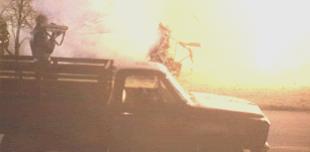 By
this time it's forty minutes into the movie and most action movie
fans are thinking, "Isn't it about time for some Norris-Roughing-Up-Terrorists
shenanigans? Wouldn't Schwarzenegger have killed 75 economy-pack
bad guys by now?" And Mssrs. Golan and Globus couldn't agree more.
The next hour will largely concern Hunter playing Batman-Interrogates-The-Terrified-Stoolie
with various terrorists – at least, if Batman did things
like nail stoolie's hands to tables with commando knives, or blew
out the brains of uncooperative stoolies to give the surviving
tattletale a little nudge in the properly loquacious direction.
Then Hunter will crop up in the Nick
Of Time™ and whittle down the terrorist army a little, we will cheer, and
the movie will move on to the next setpiece, until we run out
of setpieces and, therefore, movie.
By
this time it's forty minutes into the movie and most action movie
fans are thinking, "Isn't it about time for some Norris-Roughing-Up-Terrorists
shenanigans? Wouldn't Schwarzenegger have killed 75 economy-pack
bad guys by now?" And Mssrs. Golan and Globus couldn't agree more.
The next hour will largely concern Hunter playing Batman-Interrogates-The-Terrified-Stoolie
with various terrorists – at least, if Batman did things
like nail stoolie's hands to tables with commando knives, or blew
out the brains of uncooperative stoolies to give the surviving
tattletale a little nudge in the properly loquacious direction.
Then Hunter will crop up in the Nick
Of Time™ and whittle down the terrorist army a little, we will cheer, and
the movie will move on to the next setpiece, until we run out
of setpieces and, therefore, movie.
That first setpiece is a real honey, taking place
in a shopping mall during the Christmas season. It involves a
bomb left in a shopping bag in a busy store. This leads to the
terrorist being chased through the mall by a Good Samaritan with
the bag he thinks the terrorist dropped, and I would be lying
if I said that idea didn't do my heart some good. This possible
come-uppance, though, is short-circuited by some of the terrorist's
pals cutting down the bomb-carrying Samaritan with machine gun
fire. And they're not using easily-concealed automatic weapons,
either – they're using assault rifles and something that
looks like a Schmeisser submachine gun. How did anybody miss these
guys carrying those?
Well, Hunter, of course, puts an end to these
hi-jinx by driving through the mall's plate-glass doors and using
his own lead-sprayers: a brace of Uzi machine pistols in a strange
harness that lets the guns hang by his side, 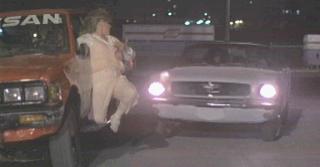 allowing
a sort of cowboy quick draw. The two surviving terrorists steal
a truck from a display and take a hostage by grabbing a woman
through the driver's side window in the parking lot, and here
is one of the best stunts of the pre-CGI 80s: Hunter pursues the
truck through the streets of the city, a stunt woman hanging onto
the side of the truck for dear life.
allowing
a sort of cowboy quick draw. The two surviving terrorists steal
a truck from a display and take a hostage by grabbing a woman
through the driver's side window in the parking lot, and here
is one of the best stunts of the pre-CGI 80s: Hunter pursues the
truck through the streets of the city, a stunt woman hanging onto
the side of the truck for dear life.
The setpieces continue in a fairly efficient comic
book manner, with Hunter arriving in the Nick
Of Time™ and distributing terrorist just-desserts with the mandatory one-liner
(Movie Law #12). The most head-scratching of these involves a
bunch of gun-toting parents loading their children onto a school
bus, so that they may be taken "to the country, where it's safer." The tearful parting would tug at the heartstrings if the viewer
wasn't dumbfounded by the concept of placing such a juicy target
in harm's way without any sort of armed guard or escort for
the bus!!! So naturally, car full of terrorists (you'd think
a bunch of guys in a car, all wearing berets, would be a tip-off)
draws alongside the bus (after running over a roadcrew signal
man, just in case we forgot they were bad guys) and attach a magnetic
time bomb to the side of the bus. This is unnoticed by the bus
driver or anyone else on the road. Well, there is the one little
girl whose window the bomb is below, but she just stares at it
while everybody else sings Row Row Row Your Boat.
EXCEPT FOR HUNTER (fanfare!), who drives on the
shoulder of the road, plucks the bomb off the bus, and deposits
it on the hood of the terrorist's car. I'm reasonably certain
that my readership, given a few seconds, would come up with a
better one-liner than "You lose this?", but the writers couldn't.
We have to give the film some credit, though – after this, Hunter goes to a scene where he didn't arrive
in the Nick Of Time™, a carnival
where obviously a lot of people died. It is here that Hunter reveals
his Master Plan to the Agency Weasel, and if you predict that
this will end with Hunter pointing a rocket launcher at Rostov
and saying, "It's Time", well…. You've seen just as many
action movies as me. Or the filmmakers.
I knew I would have a particularly hard time reviewing
a movie like Invasion USA, given the events of the past
couple of years. In 1985, when Invasion was made, America's
experience with terrorism on its shores was limited to abortion
clinic bombings and Klan cross burnings; the Murrah Federal Building
and the World Trade Center still stood, and the country could
still cozily 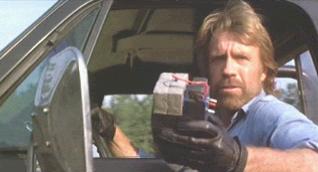 pretend
that stuff like this happened in other places, not here.
Invasion tells its tale from a position of naivete, and
I feared that position would undo it as I watched it from a 21st
Century perspective, undo it even more than its status as a Big
Dumb Action Movie.
pretend
that stuff like this happened in other places, not here.
Invasion tells its tale from a position of naivete, and
I feared that position would undo it as I watched it from a 21st
Century perspective, undo it even more than its status as a Big
Dumb Action Movie.
To a degree it did. Rostov's strategy takes the
central tenet of terrorism quite seriously, as a political tool
intended to turn a populace against its government (never mind
the fact that historically, it has never worked). However,
what Rostov intends to do with the chaos he has engineered is
never made clear – apparently, screwing with Americans simply
because they are Americans seems to be justification enough
for screen terrorists. (And seemingly, for a lot of real-life
terrorists, as well. Maybe this movie isn't as naive as
I first thought) Also, in a political landscape currently rife
with media-savvy terrorists, Rostov's depredations seem small,
inefficient and above all, rather budget-conscious.
I've referred to Invasion USA as the most
chemically pure of the Chuck Norris movies; Norris does very little
in the picture but be Chuck Norris – stoic, handsome, cool.
Surprisingly, there's little hand-to-hand combat in this, although
its star's major fame was gained through the martial arts. One-Man
Army pictures are very much gun movies, and though Hunter doesn't
have the impressive arsenal of a John Matrix or a Rambo, that
odd Uzi rig does permit him to become a modern gunslinger, fast
on the draw and deadly. Hell, even though he's unarmed the first
time the female lead sees him, she immediately dubs him "Cowboy".
Ah, yes, the female lead. Melissa Prophet as McGuire,
news photographer, whom we first see after contaminating a crime
scene (the discovery of the murdered crew of that Coast Guard
cruiser at the beginning of the movie), and of course sneering
about her First Amendment rights. Fortunately the movie never
tries to force a romance between McGuire and Hunter (in violation
of Movie Law #3) – it realizes that it's sole reason for
existing is to show Norris doling out buckets of hurt to the bad
guys. It's also a good thing because McGuire is, sadly, a textbook
case of how professional women were portrayed in the movies: abrasive,
foul-mouthed, shrill. Oh, yeah, that's the way to write a strong
female role, guys – simply take all the bad traits of a male
character and put it in a skirt.
McGuire does get to prove herself worthy
of the sidekick role when she helps Hunter rescue the aforementioned
woman clinging to the side of the stolen truck – though admittedly
as unwillingly as anyone else would be in such a situation. She's
mainly along because Hunter has appropriated her car to chase
the terrorists – but really, what do you expect when you
park your Mustang convertible in the fire lane of a mall?
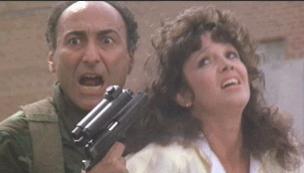 The
script squanders that goodwill, though, in a later segment when
Hunter busts up yet another terrorist enterprise in the Nick
Of Time™ – McGuire is taking photos of a near-riot at a beleaguered
grocery store (the terrorist attacks have disrupted the lines
of supply), when a bunch of bad guys disguised as National Guardsmen
drive up (and McGuire is showing a near-Hunteresque ability to
show up at these things). The nasties are about to re-enact Kent
State when Hunter arrives to provide them with extra ventilation
in the vital parts. McGuire is taken hostage by Rostov's second-in-command
Nikko, and the photographer's major contribution is to scream,
"Hunter! Do something, you sh*t!" And, when he does
do something (namely using ninja-like stealth to get Nikko
to shoot himself), she calls him a "stupid son-of-a-bitch" and
throws a trash can lid at him. Admittedly, Hunters extreme coolness
under this abuse is amusing ("I better leave before you get
mad," he deadpans), but it doesn't serve the character of
McGuire very well. It's actually a relief when the character all
but vanishes from the rest of the movie.
The
script squanders that goodwill, though, in a later segment when
Hunter busts up yet another terrorist enterprise in the Nick
Of Time™ – McGuire is taking photos of a near-riot at a beleaguered
grocery store (the terrorist attacks have disrupted the lines
of supply), when a bunch of bad guys disguised as National Guardsmen
drive up (and McGuire is showing a near-Hunteresque ability to
show up at these things). The nasties are about to re-enact Kent
State when Hunter arrives to provide them with extra ventilation
in the vital parts. McGuire is taken hostage by Rostov's second-in-command
Nikko, and the photographer's major contribution is to scream,
"Hunter! Do something, you sh*t!" And, when he does
do something (namely using ninja-like stealth to get Nikko
to shoot himself), she calls him a "stupid son-of-a-bitch" and
throws a trash can lid at him. Admittedly, Hunters extreme coolness
under this abuse is amusing ("I better leave before you get
mad," he deadpans), but it doesn't serve the character of
McGuire very well. It's actually a relief when the character all
but vanishes from the rest of the movie.
But to complain that this movie isn't terribly
realistic would be the critical version of squashing a bug with
a two-ton block of granite. This is not a political thriller,
character study, or even a cautionary tale... It is a Big Dumb
Action Movie, made during the Golden Age of the Big Dumb Action
Movie by Big Dumb Action Movie Masters. It is the sort of movie
where rocket launchers are considered ideal close-quarters weapons
in an enclosed space. We are here to see Chuck Norris give faceless
bad guys complimentary tickets to Hellapalooza, then maybe slap
Richard Lynch around a little, and if a lot of things go boom
in the process, so much the better. In that the movie certainly
succeeds in a workmanlike, entertaining fashion.
Invasion USA was released at the height
of Golan-Globus' power. Cannon had become a financial power to
be reckoned with, and though it was largely known for this kind
of fare – loud, empty-headed action or trendy fare like Breakin'! – the two Israeli producers also backed smaller, more thoughtful
fare like Shy People, Jean-Luc Godard's King Lear and
Norman Mailer's Tough Guys Don't Dance. The Go-Go Boys'
nickel eventually tarnished, however, and their money-making magic
withered under the onslaught of such expensive flops as Tobe Hooper's
Lifeforce, the Stallone arm-wrestling epic Over The
Top and the still-reeking insult to many childhood memories
which is Masters of the Universe.
The Go-Go Boys split soon after, and separately
produced such oddities as the two
conflicting Lambada movies… but that is something for
another B-Master to dwell upon. Golan and Globus have since patched
up their differences and are again making movies under the aegis
of New
Cannon Incorporated – but a look at their 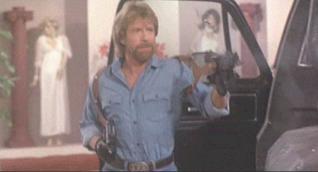 current
slate of movies – and let's face it, when Billy Drago and
Olivier Gruner are your Big Stars, you are in trouble – sadly
shows that the Go-Go Boys' luster has largely faded.
current
slate of movies – and let's face it, when Billy Drago and
Olivier Gruner are your Big Stars, you are in trouble – sadly
shows that the Go-Go Boys' luster has largely faded.
But even if they never produce another empty things-go-boom
epic, another sequel in a franchise that nobody wanted, or another
dance-based storyline, Golan and Globus did dominate popular
entertainment for a decade, providing a hell of a lot of people
with escapist entertainment during a troubled time, and exhibits
in the personal cinematic museum we all carry within us from our
youth. If you lived in the 80s, you saw at least one Cannon movie
in the theaters. And if you say you didn't, you're a big fat liar.
That, my friends, is a legacy some people would
kill to possess.